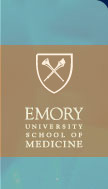



November 2007
New department leadership
 I do not think I have ever had the privilege of announcing three new SOM department chairs at one time. Many of you know by now that Dr. Katherine Heilpern officially has been named Chair, Department of Emergency Medicine, effective Sept. 1. She has shown her energetic and innovative leadership abilities as Interim Chair for the past year during the absence of Dr. Arthur Kellermann, who was serving as Robert Wood Johnson Health Policy Fellow in Washington and now has been named Associate Dean for Public Policy.
I do not think I have ever had the privilege of announcing three new SOM department chairs at one time. Many of you know by now that Dr. Katherine Heilpern officially has been named Chair, Department of Emergency Medicine, effective Sept. 1. She has shown her energetic and innovative leadership abilities as Interim Chair for the past year during the absence of Dr. Arthur Kellermann, who was serving as Robert Wood Johnson Health Policy Fellow in Washington and now has been named Associate Dean for Public Policy.
After receiving her medical degree here at Emory, Dr. Heilpern completed her postgraduate training at Temple School of Medicine and served as a medical officer for the Indian Health Service and on a Navajo reservation. Dr. Heilpern returned to Emory in 1996 and has served as Assistant Dean of Medical Education and Student Affairs and Vice Chair for Academic Affairs for the department. She recently was named President-Elect of the Society for Academic Emergency Medicine.
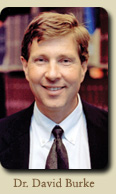 Dr. David Burke joined the SOM on Oct. 1 as Chair, Department of Rehabilitation Medicine. He comes to us from Harvard Medical School, where he was the Director, Traumatic Brain Injury Clinical Unit, Spaulding Rehabilitation Hospital. Dr. Burke received his medical degree from the Medical University of South Carolina and completed his internship and residency at Louisiana State University Medical Center in New Orleans. As one of the founding faculty members of the Department of Physical Medicine and Rehabilitation at Harvard, Dr. Burke has directed its Residency Program since 1996, with accolades from his trainees for his dedication and clinical expertise. He is founder and editor-in-chief of Rehab in Review and has served as an FBI and U.S. Department of Homeland Security consultant.
Dr. David Burke joined the SOM on Oct. 1 as Chair, Department of Rehabilitation Medicine. He comes to us from Harvard Medical School, where he was the Director, Traumatic Brain Injury Clinical Unit, Spaulding Rehabilitation Hospital. Dr. Burke received his medical degree from the Medical University of South Carolina and completed his internship and residency at Louisiana State University Medical Center in New Orleans. As one of the founding faculty members of the Department of Physical Medicine and Rehabilitation at Harvard, Dr. Burke has directed its Residency Program since 1996, with accolades from his trainees for his dedication and clinical expertise. He is founder and editor-in-chief of Rehab in Review and has served as an FBI and U.S. Department of Homeland Security consultant.
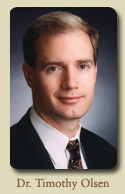 Dr. Timothy Olsen has been appointed Phinizy Calhoun, Sr. Chair of Ophthalmology, effective on Jan. 1, 2008. He completed a vitreoretinal surgery and disease fellowship here under the current Chair, Dr. Thomas Aaberg Sr., from 1994 to 1996 and earned a Clinical Best Teaching Award in the process (one of four teaching awards he has received). He comes to Emory from the University of Minnesota, where he currently serves as Professor and Knobloch Retina Chair and Director of the Lions Macular Degeneration Center. Dr. Olsen has received national recognition for his research into age-related macular degeneration (AMD) and other retinal diseases. He and several colleagues, including molecular biologist Dr. Jeffrey Boatright at Emory, hold a U.S. industry patent for a synthetic version of an ancient Asian remedy, bear bile, to treat visual disorders.
Dr. Timothy Olsen has been appointed Phinizy Calhoun, Sr. Chair of Ophthalmology, effective on Jan. 1, 2008. He completed a vitreoretinal surgery and disease fellowship here under the current Chair, Dr. Thomas Aaberg Sr., from 1994 to 1996 and earned a Clinical Best Teaching Award in the process (one of four teaching awards he has received). He comes to Emory from the University of Minnesota, where he currently serves as Professor and Knobloch Retina Chair and Director of the Lions Macular Degeneration Center. Dr. Olsen has received national recognition for his research into age-related macular degeneration (AMD) and other retinal diseases. He and several colleagues, including molecular biologist Dr. Jeffrey Boatright at Emory, hold a U.S. industry patent for a synthetic version of an ancient Asian remedy, bear bile, to treat visual disorders.
TOP
Eye on the future
The most comprehensive eye center in Georgia is right here at Emory. The Department of Ophthalmology is one of the top 15 NIH-funded facilities in the United States and consistently is ranked as one of the 10 best eye centers in the country by the professional journal, Ophthalmology Times. Much of this is a credit to Thomas Aaberg Sr., Phinizy Calhoun Sr. Chair, who has been at the helm since 1988. On the occasion of his 10th anniversary, many people gave to a $1 million endowed fellowship in his honor. Dr. Aaberg will resign his post at the end of the year but will continue practicing full-time as a retina surgeon. Here are a few of the department’s recent accomplishments:
• |
The National Eye Institute awarded one of only three R-24 grants in its history to Emory and two partner universities to develop new ways to deliver therapeutic drugs to the back of the eye in a less painful and risky way than with injections currently available. “We are looking at better ways to go through the sclera, which is large and soaks up drugs like a sponge,” says Dr. Henry Edlehauser, who is Director of Research and is the study’s co-principal investigator. |
• |
Dr. Daniel Martin recently started recruiting patients for a study to compare the effects of the cancer-fighting drug, Lucentis, with its older, lower-cost cousin, Avastin, to treat AMD. Dr. Baker Hubbard published an earlier study showing that Lucentis can maintain vision in 90% of those with newly diagnosed wet AMD. Avastin, however, costs $19 for each injection, while Lucentis, which is FDA approved, can cost $2,000 an injection. Both agents protect the retina by inhibiting growth of new blood vessels that can leak and destroy central vision. |
• |
Emory Vision is the first laser vision correction center in the Southeast to acquire the latest system available in the country, the Eye-Q system, which provides shorter, more comfortable procedures for patients. Emory has been a leader in LASIK development for the past 20 years. |
TOP
Preparing for the LCME
I heartily commend the SOM’s accreditation team, which is hard at work preparing for a Liaison Committee on Medical Education (LCME) site visit March 2-5. “To maintain accredited status, all medical schools must complete an extensive self-study and undergo a site visit every eight years,” says Dr. Alan Otsuki, Associate Dean for Medical Education and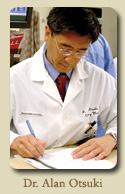 Student Affairs. “The implementation of a new curriculum, our new building designed specifically for teaching, and funds specifically allocated for faculty highlight our commitment to medical education.”
Student Affairs. “The implementation of a new curriculum, our new building designed specifically for teaching, and funds specifically allocated for faculty highlight our commitment to medical education.”
Drs. Otsuki and William Eley, Executive Associate Dean for Medical Education and Student Affairs, began getting ready for the site visit early in 2007. The deans formed five committees comprised of administrators, faculty, staff, and students to represent each LCME standard area—institutional setting, educational programs, medical students, faculty, and educational resources. The committees are gathering and analyzing data for this project, and an independent group of students is analyzing each standard area from their perspective. In November, the LCME Executive Committee will provide a report with conclusions about our strengths and weaknesses as well as recommendations for improvement to the LCME and our site-visit team.
Everyone in the SOM benefits from this accreditation process. It develops a self-study that requires institution-wide participation and enables the SOM to keep evolving through a continuous improvement process. This self-study is helpful for strategic planning and for evaluating and monitoring the school’s programs. “Our self-study has already confirmed substantial faculty and clinical training resources, a strong institutional foundation, and an exceptionally talented group of students well prepared for graduate medical education. This process also will result in a set of recommendations that will help us ensure a successful curriculum and learning environment for our students,” reports Dr. Otsuki.
TOP
Top AHA honor
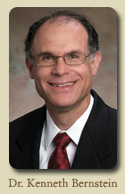 Dr. Kenneth Bernstein (Pathology) received the 2007 Basic Research Prize, a national honor from the American Heart Association. The AHA created the award in 1990 to recognize researchers for their contributions to the advancement of cardiovascular science. Dr. Kathy Griendling (Medicine) received the 2004 prize. Dr. Bernstein is only the fourth researcher—and the only one performing regular clinical work—to receive both AHA awards, the Basic Research Prize (2007) and the Novartis Award for Hypertension Research (2005).
Dr. Kenneth Bernstein (Pathology) received the 2007 Basic Research Prize, a national honor from the American Heart Association. The AHA created the award in 1990 to recognize researchers for their contributions to the advancement of cardiovascular science. Dr. Kathy Griendling (Medicine) received the 2004 prize. Dr. Bernstein is only the fourth researcher—and the only one performing regular clinical work—to receive both AHA awards, the Basic Research Prize (2007) and the Novartis Award for Hypertension Research (2005).
This is a great honor for him, as he will be in the company of three renowned recipients, Drs. Robert Lefkowitz, Louis Ignarro, and Richard Lifton, who all are National Academy of Sciences members.
TOP
Important Winship grant
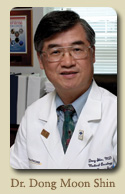 The NCI has awarded the Winship Cancer Institute a five-year, $12.5 million Specialized Program of Research Excellence (SPORE) grant in head and neck cancer. It is the first SPORE grant ever received in Georgia. Dr. Dong Moon Shin (Hematology/Oncology) is principal investigator.
The NCI has awarded the Winship Cancer Institute a five-year, $12.5 million Specialized Program of Research Excellence (SPORE) grant in head and neck cancer. It is the first SPORE grant ever received in Georgia. Dr. Dong Moon Shin (Hematology/Oncology) is principal investigator.
Emory is one of only five head and neck cancer SPORE centers in the country. The program will consist of four translational research projects in which researchers will study a combination of polyphenon (found in green tea) with a growth inhibitor to prevent premalignant head and neck lesions, develop therapies aimed at blocking cellular pathways that allow metastatic cancer cells to proliferate, test the effectiveness of curcumin (found in the spice turmeric) to destroy cancer cells, and develop biodegradable nanoparticles to deliver Taxol directly to cancer cells.
TOP
In memory
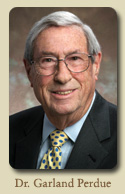 Dr. Garland Perdue died in September at the age of 81. Dr. Perdue was awarded a scholarship to Emory at age 15, completed two years of service as a highly decorated first sergeant in Europe during World War II, and then graduated from the SOM in 1952 and later joined the faculty. He became director of the Division of Vascular Surgery in 1957. Dr. Perdue served in the Department of Surgery for more than 40 years, during which time he performed the state’s first kidney transplant in 1966 and established the SOM’s and the nation’s first accredited vascular surgery training program. He became Medical Director of Emory Hospital in 1983 and Director of Emory Clinic in 1984, positions in which he served until 1993 when he became Executive Director of Emory Healthcare.
Dr. Garland Perdue died in September at the age of 81. Dr. Perdue was awarded a scholarship to Emory at age 15, completed two years of service as a highly decorated first sergeant in Europe during World War II, and then graduated from the SOM in 1952 and later joined the faculty. He became director of the Division of Vascular Surgery in 1957. Dr. Perdue served in the Department of Surgery for more than 40 years, during which time he performed the state’s first kidney transplant in 1966 and established the SOM’s and the nation’s first accredited vascular surgery training program. He became Medical Director of Emory Hospital in 1983 and Director of Emory Clinic in 1984, positions in which he served until 1993 when he became Executive Director of Emory Healthcare.
In 2004, Emory’s Medical Alumni Association honored Dr. Perdue with its Award of Honor, its highest distinction. In addition, the SOM recently established the Garland Perdue Lectureship in Vascular Surgery. We definitely will miss this pioneer surgeon and good friend.
TOP
Thomas J. Lawley, MD
Dean, Emory School of Medicine
TOP
Current Issue • Past Issues • SOM Home
Contact Us • Give a Gift
Copyright © Emory University, 2007. All Rights Reserved